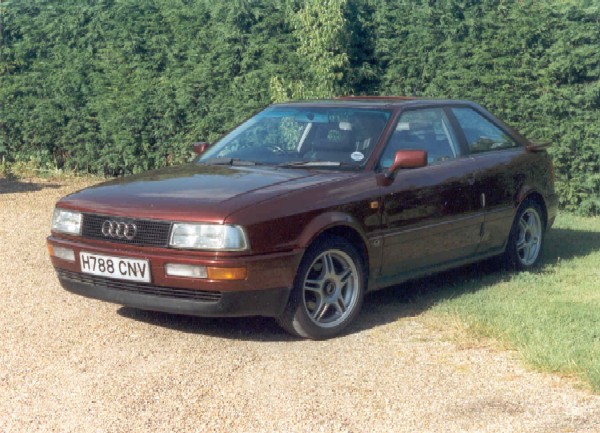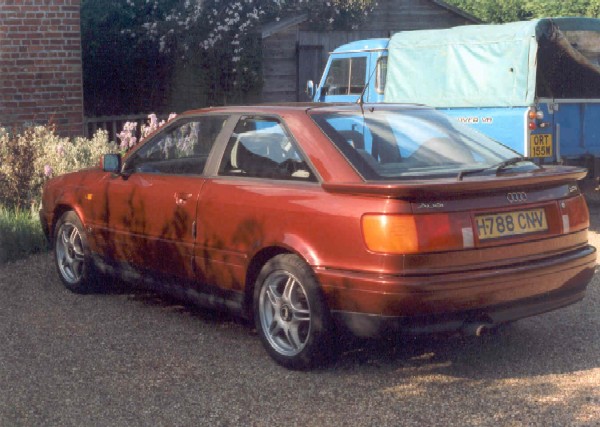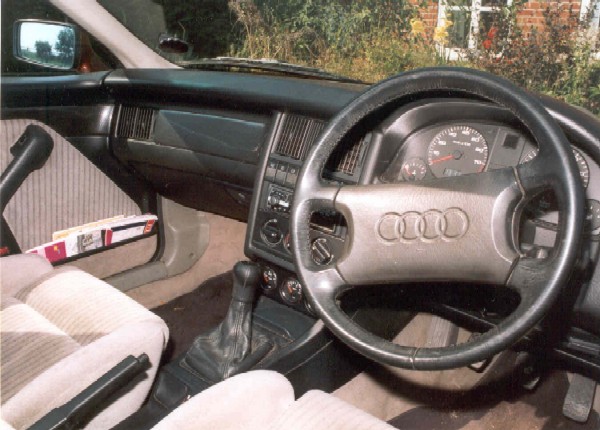![]()

My first 20V Coupe. Wheels are non-original.
I love old German cars. At banger level, you'll struggle to find anything as solid, dependable and rust-resistant as an Eighties or early Nineties VW, Audi, Beemer or Merc (apart from big Swedes of course). I've owned about a dozen German motors of various ages and sizes, and right now I have two in my fleet - a 1981 Golf GTI (my third - story to come) and an Audi Coupe 20V. The 20V is the second of these cars I have owned, and without doubt the fastest, most comfortable, most refined and most beautifully-built car I have ever bought for under a grand. There's a reasonable amount of information already available on the Web, so all I'm going to do here is give you my personal view, one or two tips which I have found helpful, and some links to other 20V resources.
I suspect one of the reasons old Audis are so cheap these days is that the Audi range at the end of the Eighties was incredibly complex. Audi tended to 'mix and match' engines, bodies and drivetrains, and the result is that it can be difficult to work out what kind of Audi you actually want. So let's start by simplifying things. We are talking here about the 20 valve, twin-cam five cylinder engine in 170 BHP non-turbo form, engine code 7A. This engine was fitted into two different bodies - the four-door 90 saloon, and the two-door Coupe, both of which form part of the 'Type 89' family and are identical from the front bumper to the windscreen. The 20V saloon and coupe were available from 1988-91 with either front wheel drive, or 'Quattro' four-wheel drive. There were other variants of both cars - 10 valve five cylinder motors, and (for the Coupe) the standard VW group 2 litre 'four'. Late coupes had V6s and 16 valve 'fours', but these are still unlikely to turn up at banger money unless very tired and tatty. There was also the S2 Coupe, which had the 230 BHP turbocharged version of the 20 valve motor and is rightly regarded as a modern classic, with prices to match. However, I'll ignore all these other vehicles and just focus on the 7A-engined cars.
I bought my first 20V Coupe about three years ago, and did 25,000 miles before the car fell victim to a hit-and-run driver. I had actually gone looking for a decent Mk2 Golf GTI, but all the ones I looked at had been 'got at' by the Max Power boys (note: ride and handling on a Golf GTI are NOT improved by fitting 19 inch wheels with 40-section tyres). Then I saw the Audi for sale, test drove it and loved it. Admittedly I paid more than banger price at the time, but these cars are now three years older, and used car values have gone into freefall, so you can easily pick up a 20V for under a grand. In fact, if you go for the 90 saloon, you could get it for a lot less - I have seen these sell for as little as £300, which is awesome value and then some. My current 20V Coupe, admittedly with short MOT and a couple of minor problems to fix, cost me £820, and it's a straight, tidy car in a good colour (black) with a nice spec (smart alloys, air-con, CD player). I spent about £300 to get it sorted (including a full service) and it went on to cover 10,000 miles in six months without a hiccup. (Although I ended up changing the engine because the oil consumption was becoming excessive - cause was badly worn bores, probably due to neglected oil changes and/or being thrashed from cold.)

A handsome looking car from any angle
So what's good about them, from a banger point of view? Firstly, quality. Galvanised body means no rot, unless the car has been in a shunt and badly repaired. Most of the components are high quality, and the build quality is consistent. Things go wrong with them, but they are always the same things, at the same age and mileage. The 7A engine is one of the most durable petrol engines ever built - in the USA, people are getting 400,000 miles or more out of them. (And I still stand by those comments even though I have just had to replace my own engine at 132K. No engine is completely indestructible, and I strongly suspect mine was mistreated by a previous owner.) Then there's the shape - subtle but classy, not obviously dated. This car looks a lot more modern and expensive than it is. Even the Coupe is surprisingly practical, thanks to a hatchback and split folding rear seat.
Then there's that engine. It sounds great even at idle, and gets better as the revs build. The red line is set at 7,000 rpm, which is unusually high for an engine of this size. The 20V shares many design features with the four cylinder motor which first appeared in the 1987 Golf GTi 16V, and has the same power delivery - at lower speeds it is smooth but not especially urgent, then as the revs climb past 4,000 the power builds rapidly and you suddenly find yourself going very quickly indeed. It's a bit like a turbo car, and gives the 20V a split personality - around town and below 3,000 revs it is as docile and tractable as a VW Golf shopping car, out on the open road, with 4,500 on the clock it becomes a devastatingly quick Grand Tourer. This is a car built for long high speed journeys - you could drive it from London to Inverness, stop for a cup of tea, then turn round and drive back, and still feel ready to party when you get home.
Parts - many people are put off Audis by fear of high running costs. However, specialists such as German Swedish & French can supply most of the common items for a fraction of what you would pay at a main dealer (example: new front brake discs and pads for about £80, and we are talking about some very big discs). Even when I have had to go to a dealer for parts not available elsewhere, the experience has not been too painful: a new distributor (commonly required on old 20Vs) was £120. There are several breakers specialising in Audis, so second-hand parts are freely available.
Bad points - the 20V is a very complex piece of machinery, and underbonnet access to most components is poor. The temperature gauge problem mentioned below is a good example: although the sender (the usual cause of gauge problems) is not expensive, you need to remove the power steering pump to get at it. It is a fairly heavy car, and tends to eat front tyres if driven hard. Fuel economy is not spectacular, 25-28 mpg depending on how the car is driven, and it really needs super unleaded (i.e. Shell Optimax) to get the best from the high compression engine. The Bosch engine management automatically adjusts the ignition timing to take account of fuel octane rating, but it isn't a very sophisticated system, and if you try to run a 20V on ordinary unleaded, you will feel the power loss.
Handling isn't great in my opinion - it may be quick, but the 20V (at least in two wheel drive form) is no sports car. You are always aware that there is a big heavy engine hanging out ahead of the front axle line, and the power steering doesn't give you enough feedback to be able to push hard through bends with real confidence. I suspect that the Quattro is a different animal - sadly I have not yet driven one. The 90 saloon was available in 'Sport Quattro' form with uprated suspension - a rare beast, but likely to be very cheap if you find one. At least the brakes are good - discs all round, and the 20V gets bigger front brakes than the lesser cars.

Interior - comfortable, well-equipped and not obviously dated.
Faults to look for - as noted above, consistent build quality means that almost every car develops exactly the same faults. Main issues I have personally experienced are as follows:
Distributor drive gear - this was made of nylon to reduce noise. The gear wears, leading to shaft endfloat which makes it 'growl' usually just above idle speed, and eventually all the gear teeth strip and the distributor stops turning - if your 20V dies without warning, or will not start when it was running perfectly last time you used it, this is one of the first things to check. Replacement distributors from Audi now have a steel gear, which is noisy right from the start but won't shed its teeth.
Handbrake - the 20V uses the Girling 38mm rear calipers found on various other VW/Audi cars of the same era, and the handbrake actuator on them is notorious for seizing. As the 20V is a heavy old beast with a decent amount of power, you may not notice the handbrake is dragging, until one of your rear brakes catches fire and envelops you in foul-smelling smoke. I have found that replacement calipers now have a stronger return spring which helps, but regular attention is still required (spray grease around the pivot point). I have heard that Mk4 Golfs have a different caliper design which can be retro-fitted to earlier Golfs, and therefore presumably to 20Vs, but I have not laid my hands on these redesigned calipers yet.
Water in boot - usually caused by cracking of the mastic used to seal the tail lights to the bodyshell. Remove taillights and reseal to cure.
Electrical problems - erratic or non-working temperature gauge is usually caused by a faulty sender unit - inexpensive but a swine to replace. Juddering rear wiper motor on Coupes can be cured by stripping and cleaning the motor. Taillights can give problems due to corrosion (caused by water leaking into them) and will then need all the contacts cleaning thoroughly. The multi-function warning display in the dash can give false warnings, especially if the car has been left standing for a while.
Fuel injection - this is badged as Bosch but is basically a Hitachi system. Although it is generally reliable, I am told that some components (especially the ECU and injectors) are now becoming hard to find. Worth bearing in mind before taking on a non-running car.
Exhaust manifold - this is prone to cracking (as with many 5 cylinder Audis). When I bought the replacement engine for my 20V, it came complete with a lovely tubular steel manifold, but I have no idea who made it. Worth investigating if you have a cracked manifold.
Further details of these and other common 20V problems can be found at the excellent site www.20v.org .
Other websites of interest:
http://www.carsurvey.org/model_Audi_Coupe.html
http://www.parkers.co.uk/choosing/car_reviews/review.aspx?range_id=100179
It's also worth looking at the Audis for sale on Ebay. My current 20V came from there.